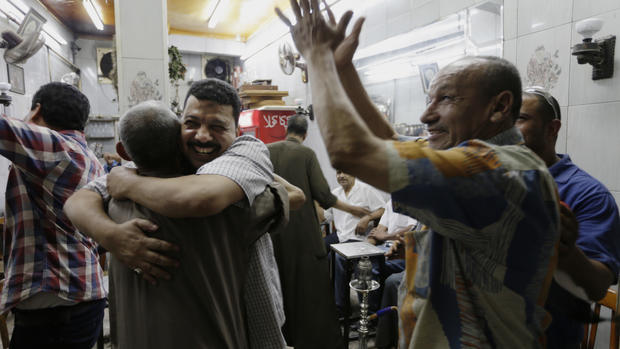In Egypt, a looming political showdown marking Morsi's first year in office
CAIRO Only one year ago Egypt's first democratically elected president stood in front of an adoring crowd of tens of thousands and symbolically took his oath of office in Tahrir Square.
That was then. Now, President Mohammed Morsi rules a country wracked by political polarization, suffering from crippling shortages of basic goods and services, and with an opposition that has promised to flood the streets on Sunday June 30 to mark the one year anniversary of his election bearing a simple message: "Leave."
- Egypt bolsters defenses ahead of planned protests against Morsi
- Egypt's army delivers an ominous warning
What started out as a petition drive under the name "Tamarod" ("Rebel!") has morphed into a major political push by Egypt's opposition. The campaign claims to have gathered 15 million signatures from Egyptians calling for Morsi to step down, though there is no way to independently verify that figure.
But there is no doubt that the country is fiercely divided over Morsi's record so far. Despite repeated promises to be a unifying president for all Egyptians, Morsi's governing style so far has been largely unilateral. He has overwhelmingly relied upon his own supporters - the Muslim Brotherhood's Freedom and Justice Party - and, increasingly, upon ultraconservative Islamist parties to back his agenda.
That, coupled with crushing economic problems, a debilitating shortage of gasoline and electricity cuts, and a weakening currency has escalated criticism of President Morsi and his policies. But he gave no sign of backing down when he addressed the nation Wednesday night. During a marathon 2 ½ hour long televised speech, Morsi was by turns conversational and confrontational, admitting he's made mistakes but also blaming Egypt's persistent problems on remnants of Hosni Mubarak's ousted regime.
"There are those who fantasize about turning the clock back," he said, but promised to forge ahead with "Egypt's nascent democratic experiment."
It was a speech full of red-meat populism for his supporters - and accusations for his detractors. He called out certain opponents by name, mocked them for portraying themselves as revolutionary, and claimed that Mubarak-era businessman are bankrolling the rising tide of discontent with his rule.
He did offer a mild concession by saying he would be open to amending Egypt's controversial constitution. But he stressed that he does not view the expected street mobilization this weekend as a legitimate means to unseat him, and urged the opposition to channel their efforts into organizing for (repeatedly delayed) parliamentary elections.
Drafted by Morsi's Islamist allies and adopted last December following a narrow victory in a countrywide referendum, the constitution is a primary target of Egypt's opposition. Prominent opposition figure Dr. Mohammed El- Baradei called for "a new regime that begins with a new constitution," saying that the current regime "has failed spectacularly."
El-Baradei spoke earlier this week at a conference organized by the opposition under the unambiguous slogan: "After the departure: Administering a post-Morsi period." They called for President Morsi to step down immediately and hand over power to the head of the Supreme Constitutional Court.
For its plan to work, the opposition is counting on at least tacit support from the military when they take to the streets on Sunday. The military has largely stayed out of politics ever since it handed power over to Morsi following last year's presidential elections. But a statement issued by Minister of Defense Abdel Fattah al-Sissi last Sunday said that the military is prepared to reenter politics to "save Egypt from entering a dark tunnel of internal conflict".
For some, the prospect of the military stepping back into the political arena is a major step back for the country's transition to democratic rule following the mass uprising of 2011 that forced Hosni Mubarak to resign.
"We cannot even think about that the army will come back and rule the country," presidential spokesperson Ihab Fahmy said earlier this week in a briefing to foreign reporters.
But there are members of the opposition who want just that. They are demanding a reset of the transitional period: a return to the 1971 constitution until a new one can be drafted, and the formation of a caretaker government of technocrats.
The military has called up reserves and deployed its forces across the country in anticipation of unrest. Over the past week Morsi's administration has been at pains to portray itself as firmly in command of the military. "Anything that happens through the army is coordinated with the president as supreme commander of the army," said Fahmy.
Even if Egyptians dissatisfied with Morsi's rule turn out in large numbers on Sunday, the president is not without his supporters. Over the past week the Muslim Brotherhood and its Islamist allies have twice rallied large crowds in support of the president and as a warning to the opposition camp that seeks to force him from office.
One pro-Morsi demonstrator, Mohammed Felham, came out last Friday sporting across his forehead a green bandana emblazoned with the Islamic profession of faith. "Morsi is the only president we have elected, we have chosen," he said, and argued that the number of petitions the opposition claims to have gathered is irrelevant because of Morsi's electoral legitimacy.
Felham says no matter how many Egyptians turn out for Sunday's demonstrations, Morsi and his supporters can mobilize more. "They are waiting in their own homes for one thing," he said. "The moment Morsi says, 'You come here'... they will come! Even 16 million, 17 million, 19 million. But when we say millions, it's millions!"
Riven to the core by political polarization and bracing for protests that many fear could turn violent, Egyptians on all sides of the political spectrum have one thing in common: a sense of foreboding over what the weekend will bring.
